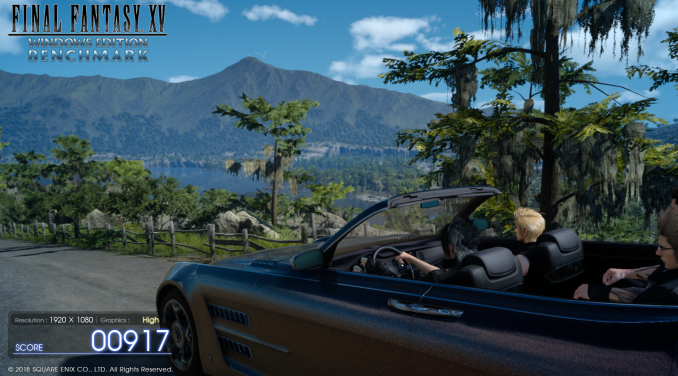The NVIDIA GeForce RTX 2060 6GB Founders Edition Review: Not Quite Mainstream
by Nate Oh on January 7, 2019 9:00 AM ESTFinal Fantasy XV (DX11)
Upon arriving to PC earlier this, Final Fantasy XV: Windows Edition was given a graphical overhaul as it was ported over from console, fruits of their successful partnership with NVIDIA, with hardly any hint of the troubles during Final Fantasy XV's original production and development.
In preparation for the launch, Square Enix opted to release a standalone benchmark that they have since updated. Using the Final Fantasy XV standalone benchmark gives us a lengthy standardized sequence to utilize OCAT. Upon release, the standalone benchmark received criticism for performance issues and general bugginess, as well as confusing graphical presets and performance measurement by 'score'. In its original iteration, the graphical settings could not be adjusted, leaving the user to the presets that were tied to resolution and hidden settings such as GameWorks features.
Since then, Square Enix has patched the benchmark with custom graphics settings and bugfixes for better accuracy in profiling in-game performance and graphical options, though leaving the 'score' measurement. For our testing, we enable or adjust settings to the highest except for NVIDIA-specific features and 'Model LOD', the latter of which is left at standard. Final Fantasy XV also supports HDR, and it will support DLSS at some later date.



At 1080p and 1440p, the RTX 2060 (6GB) returns to its place between the GTX 1080 and GTX 1070 Ti. Final Fantasy is less favorable to the Vega cards so the RTX 2060 (6GB) is already faster than the RX Vega 64. With the relative drop in 4K performance, there are more hints of 6GB being potentially insufficient.














134 Comments
View All Comments
sing_electric - Monday, January 7, 2019 - link
It's likely that Nvidia has actually done something to restrict the 2060s to 6GB - either though its agreements with board makers or by physically disabling some of the RAM channels on the chip (or both). I agree, it'd be interesting to see how it performs, since I'd suspect it'd be at a decent price/perf point compared to the 2070, but that's also exactly why we're not likely to see it happen.CiccioB - Monday, January 7, 2019 - link
You can't add memory at will. You need to take into consideration the available bus, and as this is a 192bit bus, you can install 3, 6 or 12 GB of memory unless you cope with hybrid configuration thorough heavily optimized drivers (as nvidia did with 970).nevcairiel - Monday, January 7, 2019 - link
Even if they wanted to increase it, just adding 2GB more is hard to impossible. The chip has a certain memory interface, in this case 192-bit. Thats 6x 32-bit memory controller, for 6 1GB chips. You cannot just add 2 more without getting into trouble - like the 970, which had unbalanced memory speeds, which was terrible.mkaibear - Tuesday, January 8, 2019 - link
"terrible" in this case defined as "unnoticeable to anyone not obsessed with benchmark scores"Retycint - Tuesday, January 8, 2019 - link
It was unnoticeable back then, because even the most intensive game/benchmark rarely utilized more than 3.5GB of RAM. The issue, however, comes when newer games inevitably start to consume more and more VRAM - at which point the "terrible" 0.5GB of VRAM will become painfully apparent.mkaibear - Wednesday, January 9, 2019 - link
So, you agree with my original comment which was that it was not terrible at the time? Four years from launch and it's not yet "painfully apparent"?That's not a bad lifespan for a graphics card. Or if you disagree can you tell me which games, now, have noticeable performance issues from using a 970?
FWIW my 970 has been great at 1440p for me for the last 4 years. No performance issues at all.
atragorn - Monday, January 7, 2019 - link
I am more interested in that comment " yesterday’s announcement of game bundles for RTX cards, as well as ‘G-Sync Compatibility’, where NVIDIA cards will support VESA Adaptive Sync. That driver is due on the same day of the RTX 2060 (6GB) launch, and it could mean the eventual negation of AMD’s FreeSync ecosystem advantage." will ALL nvidia cards support Freesync/Freesync2 or only the the RTX series ?A5 - Monday, January 7, 2019 - link
Important to remember that VESA ASync and FreeSync aren't exactly the same.I don't *think* it will be instant compatibility with the whole FreeSync range, but it would be nice. The G-sync hardware is too expensive for its marginal benefits - this capitulation has been a loooooong time coming.
Devo2007 - Monday, January 7, 2019 - link
Anandtech's article about this last night mentioned support will be limited to Pascal & Turing cardsRyan Smith - Monday, January 7, 2019 - link
https://www.anandtech.com/show/13797/nvidia-to-sup...